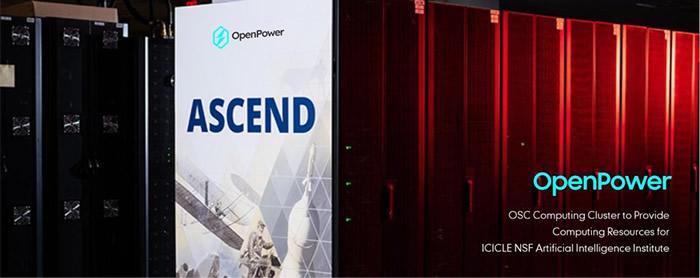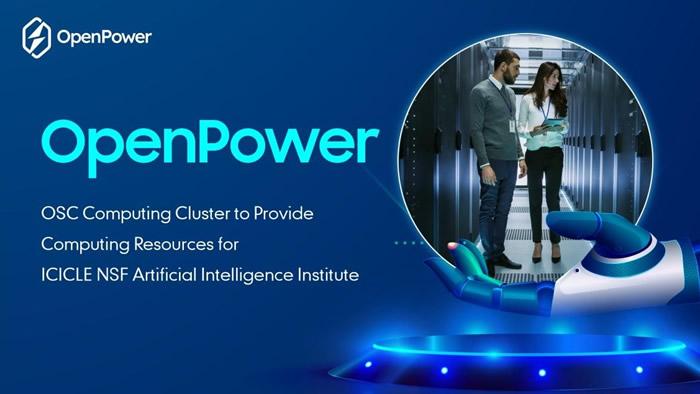OpenPower's new artificial intelligence computing cluster at the Ohio Supercomputer Center (OSC) in the United States will serve as a core collaborator for the newly NSF-funded AI Institute for Intelligent Cyberinfrastructure with Computational Learning in the Environment (ICICLE), one of eleven such AI Institutes created as part of a $200 million project announced by the National Science Foundation (NSF) today.

The AI research institutes will collectively enhance America's ability to harness the full potential of artificial intelligence to boost the economy, spur job growth, and benefit society as a whole. OSC Executive Director and OpenPower strategic advisor Dave Hudak commented, "As a statewide resource, OSC brings together various capabilities, extending supercomputing access to institutions that otherwise could not afford it. OSC's 30-year effort to democratize supercomputing perfectly aligns with ICICLE's efforts for AI, which is now the most significant driver of technological innovation.
Led by The Ohio State University, ICICLE will receive a total of $20 million over five years to build the next generation of network infrastructure to make AI more accessible to everyone. Besides The Ohio State University and OSC, Case Western Reserve University also represents one of the thirteen core institutions from Ohio participating in the project.

Three major supercomputing centers will provide high-performance computing (HPC) and large-scale data storage for ICICLE, critical technologies for artificial intelligence. Joining OSC are the Texas Advanced Computing Center (TACC) at the University of Texas at Austin and the San Diego Supercomputer Center (SCSD) at the University of California, San Diego.
The central goal of the ICICLE NSF Institute is to make artificial intelligence easy to use for scientists and non-experts alike, centered around the concept of "AI as a Service" with natural language dialogue control and visualization user interfaces and devices accessible on various platforms. The significant technical requirements of this service will be assessed by scientists from multidisciplinary backgrounds, who will design the national network infrastructure around three main application areas: intelligent food sheds, precision agriculture, and wildlife ecology.
Dhabaleswar K. (DK) Panda, a professor of Computer Science and Engineering at The Ohio State University, is the principal investigator, leading a core team of 46 academic researchers and scientists.
Meanwhile, the ICICLE NSF Institute will create a comprehensive education and professional development program aimed at significantly increasing the number and diversity of individuals with skills in artificial intelligence and network infrastructure to meet the workforce needs of the future across various fields.
Karen Tomko, Director of Research Software Applications at OSC and a principal collaborator of the institute, added, "OSC is incredibly proud to support a project that so directly makes diversity and inclusion a part of its goals. Ensuring representative participation in emerging technologies is crucial for the equitable distribution of the benefits of these advancements.

Tomko noted that the demand for increased AI training opportunities and user-friendly interfaces is not new to OSC.
Over the past few years, we've seen the workload for artificial intelligence training continuously increase on our systems. Our aim through ICICLE is to make AI training and model usage easily portable across different computing systems to meet the growing demand, not just at OSC but globally.
The complete list of core collaborating institutions includes:
-
The Ohio State University
-
Ohio Supercomputer Center
-
Case Western Reserve University
-
Iowa State University
-
Indiana University
-
University of Wisconsin-Madison
-
University of Texas at Austin / Texas Advanced Supercomputing Center (TACC)
-
University of Utah
-
University of Delaware
-
University of California, San Diego / San Diego Supercomputer Center (SDSC)
-
University of California, Davis
-
Rensselaer Polytechnic Institute
-
IC-Food
ICICLE NSF Institute has over 40 partners including the Department of Energy research laboratories, the U.S. Fish and Wildlife Service, nonprofits, university research centers, and private companies.

By joining the ICICLE NSF Institute, OpenPower not only demonstrates its strength in the global high-performance computing field but also showcases its commitment to advancing scientific research and technological development. Our new computing cluster at OSC will support this cutting-edge project by providing the necessary high-performance computing resources, ensuring that research in artificial intelligence and machine learning can progress without technological limitations. OpenPower is dedicated to helping scientists and researchers unlock the potential of AI, driving innovation and advancement across all sectors of society. This collaboration not only accelerates technological progress but also adds a new chapter to OpenPower's leadership in the global computing power market.
Related posts
2024-04-23
10 mins read
8110 Views
OpenPowers new artificial intelligence computing cluster at the Ohio Supercomputer Center (OSC) in the United States will serve as a c
2024-04-23 10 mins read 8110 Views
OpenPowers new artificial intelligence computing cluster at the Ohio Supercomputer Center (OSC) in the United States will serve as a c
2024-04-23 10 mins read 8110 Views
OpenPowers new artificial intelligence computing cluster at the Ohio Supercomputer Center (OSC) in the United States will serve as a c






